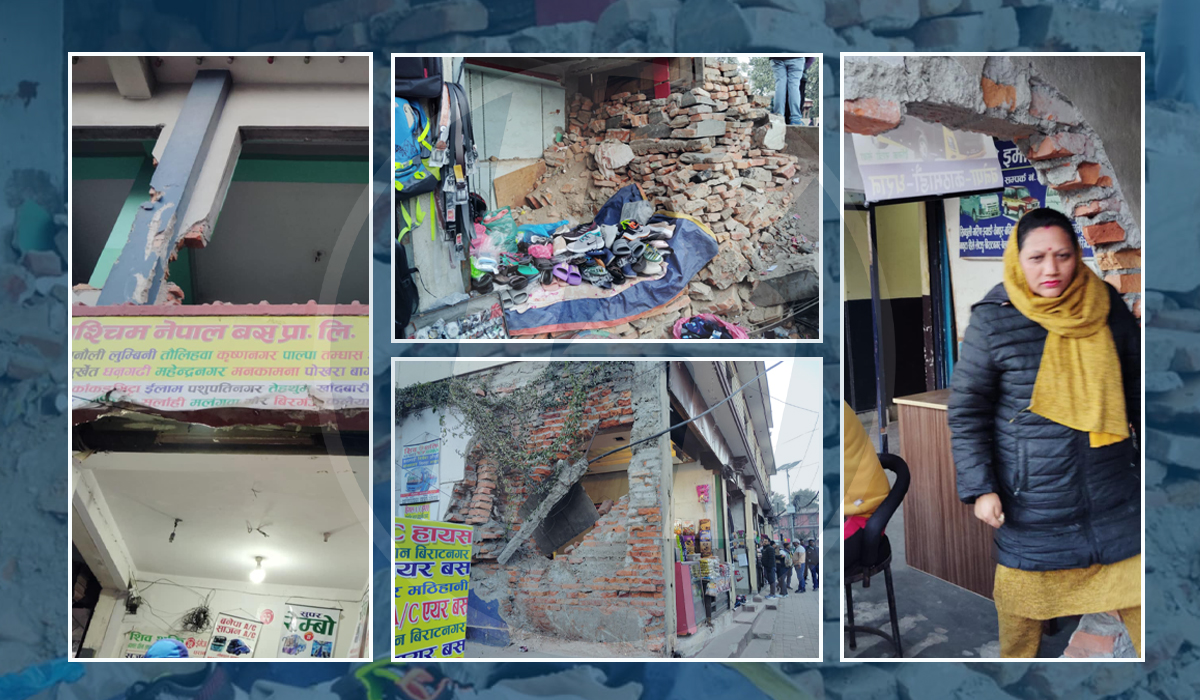KATHMANDU: After the election of the new local government under the leadership of Balendra Shah (Balen), a widespread ‘dozer campaign’ was launched in Kathmandu Metropolitan City (KMC).
The KMC authorities took a firm stance against encroachments on public land, enforcing construction regulations.
As part of this effort, on May 19, 2024, a bulldozer was used to demolish 10 houses built along the road from Gaushala Chowk to Pingalasthan, which were found to have encroached on the road.
Despite a notice being issued to clear encroachments on the land designated for the expansion of the Ring Road, residents in the area refused to vacate their homes.
The KMC then proceeded to demolish the structures on encroached land using bulldozers.
The government had decided to widen the ring road two decades ago, on August 19, 2003.
“I’ve worked in the transport sector for as long as I can remember. Now, I can’t take up any other work. Even if I go abroad, I am too old. I managed to start a company after working as a co-driver and driver. But the dispute between the Metropolitan City and the landlords has ruined our investment.”
However, for 20 years, residents did not vacate the area and instead built concrete structures on the government land.
Despite this, the Kathmandu Metropolitan City only recently began using bulldozers to remove these illegal structures, yielding a different result than expected.
The tenants who had been renting these illegal structures for their businesses have now been left stranded.
The dispute, which initially involved the government (KMC) and the homeowners, has now harmed a third party—the small business owners who had been renting from these encroachers. Many of them are now without a place to do business, as their investment is destroyed.
The Metropolitan City’s decision to demolish 10 houses led to the displacement of around 25 small businesses, as the landlords sought an interim order from the court, halting the bulldozer action temporarily.
However, the structures affected by the bulldozers are no longer safe for use.
Small business owners, who had already paid rent for more than a year verbally, are now in a tough spot.
Their businesses are gone, and they are left with the risk of losing their investments, as the structures were destroyed without any formal agreements in place with the landlords.
Some tenants are now living under tarpaulins, unable to continue their business or recover their investments.
Radha Badal, 55, from Kavre, who bought a Rajasthani Sweets and Marwari Restaurant in Gaushala five years ago, had been operating a successful business.
She had initially started with a small grocery store and, through hard work, expanded into a restaurant.
Located near the crowded southern gate of the Pashupati Temple, the restaurant had been profitable, with a monthly rent of Rs. 250,000 for two shutters.
However, after the Kahtmandu Metropolitan City demolished the restaurant, Radha’s business collapsed.
She explained, “This house has been in dispute for 30 years. For all these years, nothing happened, and we invested because we wouldn’t live here but run a hotel. The previous mayor would warn us and leave. But the current mayor demolished it.”
The landlords, who had built the structures on encroached public land, had recently lowered the rent from Rs. 250,000 to Rs. 175,000, but Radha’s investment is now tied up in the unauthorized structures.
She and others in similar situations cannot continue their businesses or recover their investments.
Radha is frustrated that after the bulldozer action, her business has been lost, and security is compromised.
He added, “We’re carrying our tickets, money, and other documents in bags. There’s no shutter, but we can’t leave the place. We still have to pay rent, even without a shutter. We hold onto the housewife’s pillar just to keep working. Where will we go if it rains or storms?”
She added, “Many had said not to open a hotel here. After the demolition, there is no business. Customers no longer want to enter the collapsed hotel. If the entire house had been demolished, we could have started somewhere else. But only the shutters were demolished, and we cannot stay or leave. It has become a mess, and we’re moving our belongings in and out every day.”
Mukesh Bhusal, who has been running Paschim Nepal Bus Pvt. Ltd. for 12 years, expressed his frustration as well.
“I’ve worked in the transport sector for as long as I can remember. Now, I can’t take up any other work. Even if I go abroad, I am too old. I managed to start a company after working as a co-driver and driver. But the dispute between the Metropolitan City and the landlords has ruined our investment.”
The landowners have stated that they are refusing to vacate the land because the government has not provided adequate compensation.
“We had to bear the losses when the landowners did that,” Bhusal adds. “We invested to earn some money. Instead of providing concessions to small businesses like ours, the government is burdening us with debt.”
Bhusal recently signed a new five-year agreement for the land, with three years still remaining. The rent for all five years has already been paid.
“The landowners are not returning the rent they’ve already received. How can they leave this land? I’m confused about who to ask this question to,” Bhusal said, expressing his frustration.
He argues that houses built on disputed land should not be rented out. “If the house is illegal, permission shouldn’t be given to operate a business,” he says, questioning the Metropolitan Municipality. “Is it fair that this dispute has lasted for 20 to 30 years?”
Sarita Giri, who has been selling footwear at the same location for 10 years, is also confused and frustrated.
The metropolis demolished the shutter of her shop as well. She has set up a small stall on the wall of her house and said, “It’s very difficult to find a business center in Kathmandu. You can’t do business with just any shutter. Business was good here because of the foot traffic, but now, even without a structure, we have no choice but to stay with our belongings.”
Bikram Gupta from Jhapa, who runs the Mithila Air Bus service, explained that the housewife has reduced the rent.
“The housewife is also worried at this time. The entire structure of the house has been damaged, but the government has not provided compensation for the demolition, leaving them in a dilemma.”
Gupta, whose vehicle route has passed through Gaushala for a long time, added that he couldn’t immediately move his operations.
His ticket counter handles AC bus services to Dharan, Dhankuta, Hile, Khandwari, Bhojpur, Kakadbhitta, and Ilam.
He went on to criticize the government’s apathy: “It’s not a government that remains silent when small businesspeople commit self-immolation! The death of a citizen and the death of an animal on the street have become the same. This system, which the leaders have set up for themselves and their circle, is fatal for the Nepali people. Only the leaders’ problems get solved.”
“Our customers know they can get tickets at Gaushala. But if they don’t sit there, customers won’t come. Without customers, there’s no business. We have to operate in these collapsed shutters because it’s inconvenient for our customers,” Gupta said.
Gupta also alleges that the government and the metropolis have ignored the impact on small businesses.
He added, “We’re carrying our tickets, money, and other documents in bags. There’s no shutter, but we can’t leave the place. We still have to pay rent, even without a shutter. We hold onto the housewife’s pillar just to keep working. Where will we go if it rains or storms?”
Kushnamani Sharma from Kathmandu has a different viewpoint. He believes the suffering is a result of the country’s ineffective leadership.
“After the cowshed shutter collapsed, we businessmen were left in a dilemma. Most citizens face the same problem. The government hasn’t given any concessions to those who want to work and live in their own country, even if it’s just small-scale business,” Sharma said.
He went on to criticize the government’s apathy: “It’s not a government that remains silent when small businesspeople commit self-immolation! The death of a citizen and the death of an animal on the street have become the same. This system, which the leaders have set up for themselves and their circle, is fatal for the Nepali people. Only the leaders’ problems get solved.”
Sharma, 60, claimed that only citizens who haven’t been sold into foreign employment still remain in the country.
“The leaders are living happily here, while others clean toilets and wash dishes in the Gulf. This system keeps selling as many citizens as it can,” Sharma said.









Comment